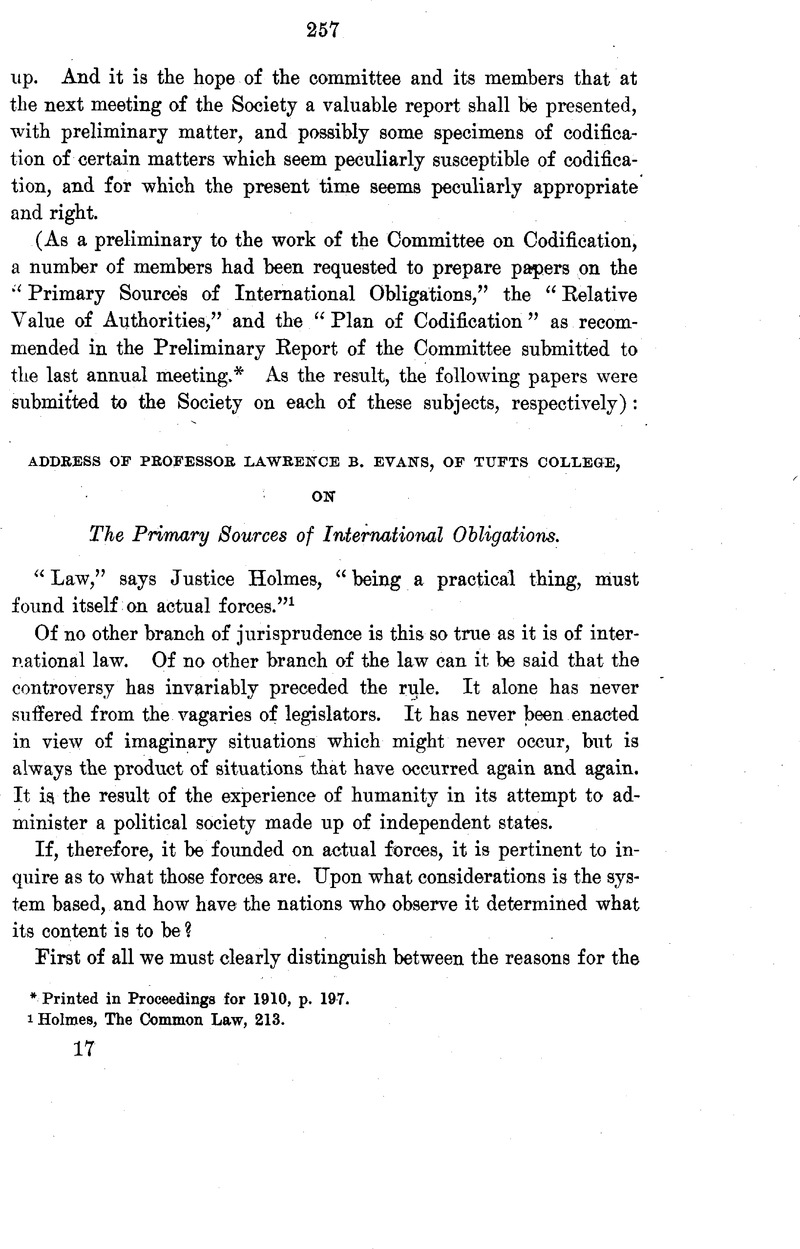No CrossRef data available.
Published online by Cambridge University Press: 27 February 2017

1 Holmes, The Common Law, 213.
2 United States v.Arredondo, 6 Peters, 691, 712.
3 The Queen v.Keyn, Law Reports, 2 Exchequer Division, 63.
4 Bryce, Studies in History and Jurisprudence, II, 742.
5 The Paquete Habanav175 U. 8. 977, 686. The court traces the history of the usage in question since the ordinance of October 26, 1403, issued by Henry IV of England and based on an agreement between himself and the King of France.
6 Pollock, A First Book of Jurisprudence, 11.
7 Gestoso y Acosta, Curso Elemental de Derecho Internacional Publico, I, 37, 39.
8 De Olivart, Tratado de Derecho Internacional Publico, I, 104.
9 Sir John Davis says: “ Custom, as understood in law, is usage which has obtained the force of law, and is in truth a binding law for the particular place, persons and things concerned.” Cited in Pollock, First Book of Jurisprudence, 264. An interesting discussion of custom as law may be found in Carter, Law: Its Origin, Growth and Function, 68-122.
10 Kent, Commentaries, I, 3.
11 “En fait,m6me de nos jours, les Etata europeens ou amgricains se sont con sidérés comme moms étroitement tenus envers les Etata musulmans et les Etats asiatiques.” Bonflls, Manuel de Droit International Public, 21.
12 Demosthenes, Oratio I contra Aristogiton.
13 Nouveau Larousse, III, 31.
14 Rivier, Principes du Droit des Gens, 1, 7. It is interesting to compare this view with that expressed in a brief filed by the distinguished counsel James C. Carter and Elihu Root in a case which involved a review in an American court of a decision made in a French court. They said, “ Except in England and some of her colonies, where the national standards of justice, and also the methods of procedure, very much resemble our own, we can have no full assurance that a just conclusion has been reached.” Hilton v.Guyot, 159 U. S. 113, 125.
15 Sir Thomas Barclay, The Encyclopedia Britannica, 11th edition, XIV, 698. Professor Westlake expresses much the same opinion in these words: “ When people of European race come into contact with American or African tribes, the prime necessity is a government under the protection of which the former may carry on the, complex life to which they have been accustomed in their homes, which may prevent that life from: being disturbed by contests between different European powers for supremacy on the same soil, and which may protect the natives in the enjoyment of a security and well-being at least not less than they enjoyed before the arrival of the strangers. Can the natives furnish such a government, or can it be looked for from the Europeans alone? In the answer to that question lies, for international law, the difference between civilization and the want of it.” Westlake, Chapters on the Principles of International Law, 141.
16 Hertslet, The Map of Europe by Treaty, II, 1254.
17 An elaborate treatment of this complicated subject may be found in an article by Dr. Andre Mandelstam on “La Justice Ottomane dans ses Rapports avec les Puissances Etrangeres” in La Revue Gfingrale de Droit International Public, XIV, 5, 534, XV, 329. See especially the resume- in XV, 371-384.
18 Hertslet, The Map of Europe by Treaty, II, 1254-5.
19 Lowell, The Eve of the French Revolution, 114; Morley, Voltaire, 230.
20 Kenny, Outlines of Criminal Law, 467; Stephen, History of the Criminal Law of England, I, 298.
21 W. A. P. Martin, “ Les Vestiges d'un Droit International dans l'Anoienne Chine,” in La Revue Generate de Droit International Public, XIV, 227, 237.
22 S. Takahashi, “ Le Droit International dans l'Histoire du Japon” in La Revue G£n6rale de Droit International Public (2d series), III, 201.